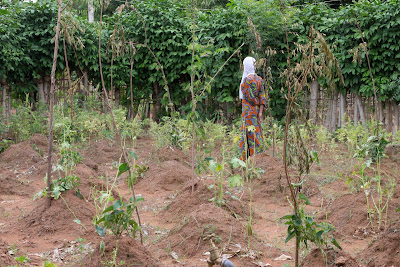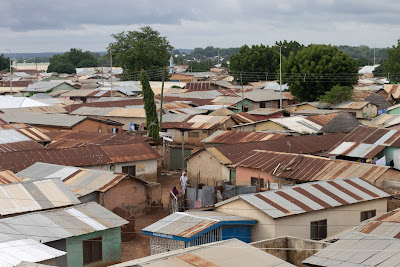I follow many Ghanaian people on Twitter at this point, rappers, and poets, visuals artists and media. "You gotta learn to swim before moving to Accra." "Accra is the new Venice." These tweets showed up on my timeline as Accra underwent another round of flooding, almost a year to the day of the disastrous floods that submerged neighborhoods in Accra last year and killed over 150 people.
People are frustrated. People are dying.
I'll get more into this later, as I'm thinking of adjusting my thesis. It just feels so dire, so urgent. And, like the government is abandoning its people.
But, I want to tell you about Tamale. We drove there Thursday, early in the morning and about an 8-hour drive from Kumasi and the Ashanti region. As we crossed over into Ghana's Northern region, cars thinned and motorcycles driven by women in hijabs filled the unpaved and pot-hole ridden streets. The clothing got longer and more conservative, though the fabrics remained just as vibrant. The pace was slower, houses and villages were separated by miles of trees and unoccupied land. Cows, goats, and chickens ran in flocks and in solo ventures.
Our first stop was the Tamale market. It was a fraction of the size of Kumasi's, but still just as easy to get lost in as a novice. We then went to visit Dr. Edward Salifu and Kassim Abdallah who spoke of rural media and the role of media in Northern Ghana, the language barriers and the high percentage of illiteracy, and the need for specific and different news than Accra circulates daily.
Friday was a full day of immersion into Tamale. We visited a beautiful mosque, early, before midday prayer commenced. Then, the same guide discussed Islam with us, and unfortunately, he felt the need to go into detail on the disconnect between terrorism and Islam. He felt the need to explain, in a country that has been colonized repeatedly, and its people enslaved and murdered in the name of Christianity, that the actions of a select group doesn't reflect an entire religion. *Sigh* He was eloquent, and thoughtful, but it just bothered me that the conversation needed to exist.
We took a quick visit to Radio Savannah, as well, to meet some journalists and hear how the upcoming election is covered in the north.
The absolute highlight of the day was taking a tour of Dr. Abdulai's Shekhinah clinic, which just celebrated its 25th anniversary. Dr. Abdulai's background is devastating. He was one of eleven, and all his siblings died from poverty-related illnesses. His father also passed away and it was just him and his mother for a long time. Until she too passed away, in his arms.
Dr. Abdulai became a doctor, as medical complications plagued his family. But his life's work became solidified in 1989, when he performed an emergency surgery under a mango tree, which began his clinic. The clinic is home to many, many mentally challenged people who's families don't know what to do, or have been on the street. People are free to come and go as they please. Some people have lived there for decades.
But Dr. Abdulai isn't trying to "cure" them, he isn't injecting their bodies with drugs. He feeds them, provides a roof over their heads and offers them love.
He also has a ward for HIV patients, he performs surgeries twice a week and consults walk-in patients 3-times a week. All of his services are free and every employee is a volunteer.
 |
| A volunteer shows us their new garden, where they are beginning to grow yams to save money on food. |






No comments:
Post a Comment